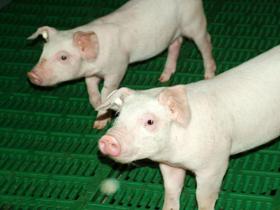Denmark: first offspring by transgenic cloned pigs

Danish scientists have welcomed the first litter of pigs born to a transgenic clone used in the study of Alzheimer’s disease, the Copenhagen Post reports.
The first transgenic cloned pigs were born in August 2007, using a new cloning method developed at the Foulum Research Centre at the University of Aarhus, Denmark. At that time, however, scientists were still unsure if the technique had interfered with the natural physiology of the animals.
Now their concerns have been taken away as researchers welcomed the first litter of piglets born to a transgenic clone last week.
World-first
According to project leader Arne Lund Jørgensen, it is a world first that a litter has been born naturally to transgenic clones.
Seven transgenic clones were created in 2007 with the added Alzheimer’s gene, to study the development of the degenerative disease.
One of the seven sows was dissected at three months of age to document that the Alzheimer’s gene had expressed itself in the animal’s brain, while four of the other sows went on to be naturally impregnated by a non-transgenic male pig.
First litter
The first litter of nine healthy piglets was born last week and the three other litters are expected by the end of the month.
The new piglets are not clones like their mother, but Jørgensen said that researchers expect 50% of the litter to carry the Alzheimer’s gene and develop signs of the disease. When all the litters are born, there could be up to 25 new pigs, including 12 with transgenic properties, available for study at the university.
“Cloning can be quite a demanding procedure and our goal with the new litters was to see if we could produce more transgenic animals naturally. We wanted to see if we could carry out the cloning process without disturbing the pig’s natural physiology,” said Jørgensen, adding that the new litters prove that transgenic animals can be created in an easier way.
Legislation
Danish legislation was changed in 2005 to allow animals to be cloned for scientific research purposes and the first cloned pigs were born in Aarhus in 2006.
The simplified ‘handmade cloning’ technique used at the University of Aarhus and developed by Gabor Vajta, is relatively inexpensive compared to traditional cloning methods and can be carried out under simple laboratory conditions.
Related website:
Copenhagen Post
University of Aarhus











